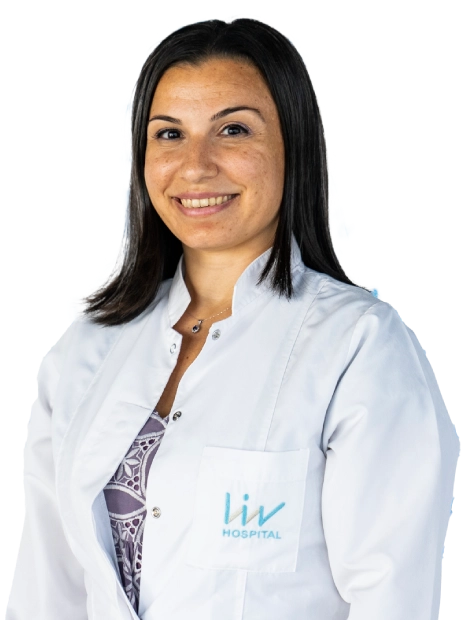-
What is a Health Check Up?
-
Why Are Regular Check-Ups Important?
-
Who Needs a Health Check-Up and How Often?
-
What to Expect During Your Check-Up Appointment
-
Common Tests and Screenings Included in a Check-Up
-
Check-Ups Tailored for Specific Needs
-
How to Prepare for Your Health Check-Up?
-
Understanding Your Check-Up Results and Next Steps
-
Check Up Packages at Liv Hospital
-
Frequently Asked Questions about Check Ups
-
Schedule Your Health Check Up at Liv Hospital
A check-up is a routine health examination focused on preventive care. It helps detect potential health issues early, assess risk factors, and monitor your overall well-being—even if you feel healthy. Often called an annual physical, routine exam, or health screening, it plays a key role in maintaining long-term health.
What is a Health Check Up?
A health check-up, also known as a general health check-up, annual physical exam, routine exam, or health screening, is a comprehensive medical evaluation designed to support preventive care. The primary objective of a check-up is the early detection of potential health issues, assessment of individual risk factors, and the protection and improvement of overall health status. By regularly monitoring key health indicators—even in the absence of symptoms—a health check-up helps identify problems at an early stage, when they are most treatable, and promotes long-term well-being through informed lifestyle and medical guidance.
Why Are Regular Check-Ups Important?
Many people overlook the long-term check up benefits, such as early detection of serious illnesses.
- Early Detection of Diseases: Conditions like heart disease, diabetes, and cancer can often be identified in their early stages—when treatment is most effective—through regular screenings.
- Preventive Care and Risk Reduction: Check-ups help identify risk factors such as high blood pressure, high cholesterol, or obesity, enabling early lifestyle or medical interventions to prevent disease onset.
- Monitoring of Chronic Conditions: For those with existing health conditions (e.g., diabetes, asthma, hypertension), regular check-ups are essential for tracking progress, adjusting treatment, and avoiding complications.
- Lower Long-Term Healthcare Costs: By catching health issues early and reducing the need for emergency treatments or hospitalizations, routine exams can lead to significant cost savings over time.
It's crucial to schedule your yearly checkup even if you feel perfectly healthy.
Who Needs a Health Check-Up and How Often?
Everyone, including those who feel healthy, should have regular health check-ups to support early detection and prevention. The recommended check up frequency varies by age and individual risk factors: children and adolescents need routine developmental check-ups, adults under 40 may need a check-up every 1–3 years, while adults over 40 and the elderly are generally advised to have annual exams.
Everyone Should Have Regular Check-Ups: Even if you feel perfectly healthy, routine health check-ups are essential for maintaining long-term wellness checkup and detecting silent or early-stage conditions.
Frequency by Age
- Children & Adolescents: Regular pediatric visits for growth monitoring, vaccinations, and developmental screening.
- Adults (18–40 years): Every 1–3 years, depending on personal health and risk factors.
- Adults Over 40: Annually or as recommended by a healthcare provider, with a focus on screening for age-related conditions.
- Elderly (65+): Typically annual checkup with additional screenings for cognitive health, bone density, and chronic disease management.
Frequency by Risk Factors: Individuals with family history of illness, chronic conditions (like diabetes, high blood pressure), or lifestyle risks (such as smoking or obesity) may need more frequent evaluations and specialized screenings.
Tailored Care Across Life Stages: Health check-up needs vary by life stage—from immunizations and growth checks in children, to reproductive health and lifestyle counseling for adults, and comprehensive chronic disease management in older adults.
What to Expect During Your Check-Up Appointment
Your check up appointment typically begins with registration and a quick update of your medical history, including any recent symptoms, lifestyle changes, or medications. A healthcare professional will then record your height, weight, blood pressure, heart rate, and other vital signs to establish a baseline for your overall health. This initial assessment helps guide the rest of the examination and any recommended tests or screenings.
Vital Signs Check
Your vital signs—blood pressure, heart rate, respiratory rate, and temperature—are measured to assess basic body functions. Abnormal readings can signal underlying issues such as infection, hypertension, or irregular heart rhythms.
Heart Exam
Using a stethoscope, the doctor listens to your heartbeat for abnormal sounds such as murmurs or irregular rhythms that could indicate heart disease or valve problems.
Lung Exam
The doctor listens to your breathing sounds to check for wheezing, crackles, or decreased airflow, which can be signs of conditions like asthma, bronchitis, or other respiratory issues.
Head and Neck Exam
This includes checking your eyes, ears, throat, lymph nodes, and thyroid gland. It helps detect infections, swelling, or abnormalities such as enlarged lymph nodes or thyroid disorders.
Abdominal Exam
The abdomen is examined by palpation, listening with a stethoscope, and sometimes light tapping. This can reveal issues such as organ enlargement, abnormal fluid, or intestinal problems.
Common Tests and Screenings Included in a Check-Up
During a health check-up, several check up tests and screenings may be conducted, but it's important to note that the specific tests vary depending on age, gender, personal risk factors, and family history. Common tests include:
- Blood Tests: To check for cholesterol levels, blood sugar, kidney function, liver function, and signs of infection or anemia.
- Urine Tests: To screen for kidney issues, diabetes, or urinary tract infections.
- Blood Pressure Measurement: To monitor for high blood pressure, a key risk factor for heart disease and stroke.
- Body Mass Index (BMI): To assess whether you're within a healthy weight range and screen for obesity-related conditions.
- Cancer Screenings: Such as mammograms for women (breast cancer) or colonoscopy for those over 45 (colon cancer), based on your age and risk factors.
- Eye and Vision Tests: To detect issues like glaucoma or poor vision, especially for those over 40.
- Hearing Tests: Particularly for older adults, to identify early signs of hearing loss.
Each of these screenings helps detect potential health problems early, enabling timely intervention and better health outcomes.
Blood Tests
Proper check up preparation, such as fasting before blood work, ensures accurate test results. Blood tests are essential for evaluating a wide range of health markers, including cholesterol levels, blood sugar (to check for diabetes), liver function, kidney function, and the presence of anemia or infections. These tests offer a snapshot of your overall health and can detect issues even before symptoms arise.
Urine Tests
Urine tests help assess kidney function and check for conditions like diabetes, urinary tract infections, or protein in the urine (which can signal kidney damage). They can also be used to screen for drug use or other metabolic issues.
Imaging Tests
Imaging tests like X-rays, ultrasounds, or CT scans may be ordered to get a detailed view of internal organs and structures. These can help detect issues like bone fractures, tumors, or problems with organs like the heart or lungs.
Heart Function Tests
Tests such as an EKG (electrocardiogram) or echocardiogram are used to assess the heart's electrical activity, check for irregular heart rhythms, and measure the heart's ability to pump blood efficiently. They are often used to detect heart disease, arrhythmias, or signs of heart failure.
Cancer Screenings
Depending on age, gender, and risk factors, cancer screenings are crucial. Examples include mammograms for breast cancer, Pap smears for cervical cancer, prostate exams for men, and colonoscopies for colon cancer. A breast check-up is essential for early detection of abnormalities, including breast cancer, and is typically recommended as part of routine health screenings for women. These tests help detect cancer at early, treatable stages.
Other Potential Tests
Other tests may include screenings for osteoporosis (bone density test), hearing tests, or thyroid function tests. The specific tests will depend on personal health needs, family history, and age-related risks.
Check-Ups Tailored for Specific Needs
While a general health check-up is important for everyone, some individuals may require more specialized screenings and assessments based on their personal health history, lifestyle, and risk factors. These tailored check-ups ensure that potential health issues are detected and managed appropriately.
Women’s Health Check-Up
A women’s health check up is designed to address the unique health needs of women at different life stages. Key components include:
- Gynecological exams, including Pap smears for cervical cancer screening and mammograms for breast cancer detection.
- Reproductive health assessments, focusing on contraception, fertility, and hormone health.
- Bone density screenings to monitor for osteoporosis, especially post-menopause.
- Pelvic exams and tests for sexually transmitted infections (STIs).
- Heart disease risk assessments, as women’s symptoms and risks may differ from men’s.
- Mental health evaluations, with attention to anxiety, depression, and postpartum health.
Men’s Health Check-Up
A men’s health check up targets the specific health concerns faced by men. Key elements include:
- Prostate exams and PSA (Prostate-Specific Antigen) tests for early detection of prostate cancer.
- Testicular exams to check for lumps or changes.
- Cardiovascular screenings to assess heart health, especially for men with high blood pressure or family history of heart disease.
- Diabetes screenings, as men are at higher risk.
- Mental health screenings to identify early signs of stress, depression, or anxiety.
- Sexual health assessments, including screenings for erectile dysfunction or low testosterone.
Check-Ups for Children and Teenagers
Regular check-ups for children and teenagers focus on growth and development, ensuring they meet physical, emotional, and developmental milestones. Key components include:
- Growth monitoring, including height, weight, and developmental progress.
- Vaccinations to ensure immunity against preventable diseases.
- Vision and hearing tests, as children can sometimes have undiagnosed issues.
- Mental health evaluations, particularly in adolescence, to detect early signs of anxiety, depression, or other behavioral issues.
- Screening for learning disabilities and support for any academic challenges.
- Nutritional assessments to encourage healthy habits.
Check-Ups for Older Adults (Over 40, Over 50, Over 65)
Over 40
After the age of 40, more frequent screenings are recommended due to the increased risk of chronic conditions. Doctors often recommend a more comprehensive check up for over 40 to screen for age-related health concerns.
Key components include:
- Cardiovascular screening, including blood pressure and cholesterol levels.
- Diabetes screening, especially for those with a family history or risk factors.
- Cancer screenings, such as mammograms for women and prostate exams for men.
- Vision and hearing tests, as age-related changes can occur.
- Bone health assessments, particularly for women to check for osteoporosis.
Over 50
For individuals over 50, the focus is on managing chronic conditions and screening for age-related diseases. Key elements include:
- Colon cancer screening through colonoscopies or stool tests.
- Increased cardiovascular and diabetes monitoring due to higher risk.
- Bone density tests for osteoporosis, especially for women.
- Cognitive health assessments, including screenings for dementia or Alzheimer’s disease.
- Vision screenings for issues like cataracts or macular degeneration.
Over 65
For those over 65, regular check-ups focus on managing chronic conditions and maintaining quality of life. Key aspects include:
- Memory and cognitive function assessments to detect early signs of Alzheimer’s or other cognitive disorders.
- Fall prevention screenings and balance assessments, as older adults are at greater risk of falls and fractures.
- Hearing tests, as hearing loss becomes more common with age.
- Immunizations for diseases like pneumonia, flu, and shingles.
- Multimorbidity management, ensuring that multiple health conditions (e.g., diabetes, arthritis, hypertension) are properly managed to maintain independence and mobility.
Medical Check-Up
A medical checkup is a general health assessment aimed at preventing disease, detecting early signs of illness, and evaluating your overall health status.
How to Prepare for Your Health Check-Up?
To ensure a thorough and effective check-up, gather your medical history, including family health conditions, past test results, and vaccination records. Prepare a complete list of all medications, vitamins, and supplements you’re currently using. Take note of any symptoms you’ve experienced and questions you’d like to ask your doctor. If your appointment includes blood tests, follow instructions on fasting, usually for 8–12 hours. Be ready to provide honest information about your diet, physical activity, smoking, and alcohol use, as this helps your doctor give the best advice. Lastly, wear comfortable clothing to make physical exams easier.
Understanding Your Check-Up Results and Next Steps
After your check-up, your doctor will review the results with you, explaining what each finding means for your overall health. They’ll highlight any areas of concern, such as abnormal blood test values or elevated risk factors, and discuss necessary lifestyle changes or treatment options. If further evaluation is needed, your doctor may schedule follow-up tests or refer you to a specialist for more in-depth assessment. Staying informed and following through with recommended next steps is key to maintaining and improving your health.
Check Up Packages at Liv Hospital
It is very important to have a check-up once a year for a healthy life. Because with a check-up, it is possible to detect diseases that have not yet shown symptoms thanks to early diagnosis, and check-ups play an important role in protecting health. Liv Check-Up Package; It consists of various checks from detailed general examination to dentist examination. The package also includes laboratory tests, detailed examinations with radiological and cardiological tests, and a dietician interview.
Our Check Up Packages:
- Liv Standard Men
- Liv Standard Women
- Liv Online – Women
- Liv Online – Men
- Liv Online - Women (Over 40)
- Liv Online - Men (Over 40)
- Liv Online Plus – Women
- Liv Online Plus - Men
- Liv Gold Cancer Screening Men
- Liv Silver Cancer Screening Men
- Liv Gold Cancer Screening Women
- Liv Silver Cancer Screening Women
- Lung Cancer Package
- Skin Cancer Package
- Gynecological Cancer Package
- Prostate Cancer Package
- Genetic Check Up
- Healthy Relationship Check-Up Program
- Neuro Check-Up
- Kidney Check-Up
Frequently Asked Questions about Check Ups
Which medical departments are involved in a check-up?
A general checkup often involves internal medicine or family medicine. Depending on your needs and risk factors, other departments such as cardiology, gynecology, urology, endocrinology, or radiology may also be involved for specialized check up screening or tests.
How long does a typical check-up take?
A standard check-up usually takes between 1 to 3 hours, depending on the number of tests and consultations included. A basic screening may be completed in under an hour, while more comprehensive packages can take half a day.
Are check-ups covered by health insurance?
Many health insurance plans cover preventive checkup, especially annual exams and basic screenings. Coverage details vary, so it's important to check your policy or contact your provider to confirm which services are included.
What is a mini check-up?
A mini check-up is a shorter, simplified version of a full check-up. It typically includes a basic physical exam, vital signs measurement, and essential blood tests. It’s useful for routine monitoring but may not detect more complex or hidden issues.
When will I receive my check-up results?
Most routine test results are available within 1 to 7 days, depending on the facility and the types of tests performed. Your doctor will contact you to discuss the results or schedule a follow-up appointment if needed.
Is an MRI typically included in a standard check-up?
No, MRI scans are not usually included in a standard check-up. They are high-cost, detailed imaging tests used only when there is a specific medical indication or if part of a premium health screening package.
Schedule Your Health Check Up at Liv Hospital
Getting a health check up is an integral part of maintaining good health. Even as simple as a normal ear exam, regular check ups can help detect any issues early, paving the way for effective treatment and better long-term health outcomes. It's essential to schedule a check up at least once a year and to be prepared with any necessary medical records and questions for your doctor. By taking an active role in your health, you can ensure that you are doing everything you can to live a healthy, happy life.
At Liv Hospital Check-Up Center, we believe that preventive healthcare is the foundation of lifelong well-being. Our comprehensive check-up programs are designed to detect potential health issues early, helping you stay ahead of illness and maintain a high quality of life. With a team of experienced medical professionals, supported by cutting-edge diagnostic technology, we provide personalized and reliable care in a modern, patient-centered environment.
Liv Hospital has seven hospitals that are helping to shape the future of healthcare. As part of its commitment to international perfection, Liv Hospitals takes its name from the initials of the slogan "Leading International Vision." LIV Hospitals offers world-class facilities and a team of experienced healthcare professionals to ensure you receive the highest quality care. Our state-of-the-art equipment and advanced technology allow us to provide comprehensive check ups tailored to your needs. Whether you need a routine checkup or have specific health concerns, our team is here to provide personalized care that is second to none.
Take control of your health today—schedule your check-up, find a specialist, or contact us for more information. Your health is our priority.
* Contents of this page is for informational purposes only. Please consult your doctor for diagnosis and treatment. The content of this page does not include information on medicinal health care at Liv Hospital .



